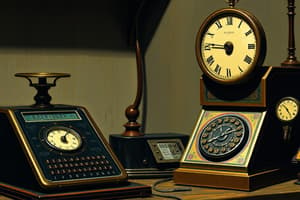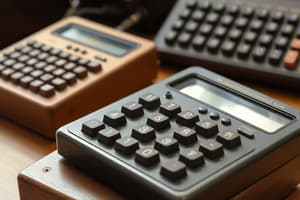Podcast
Questions and Answers
What defines a computer as a programmable machine?
What defines a computer as a programmable machine?
A computer is defined as a programmable machine because it manipulates data according to a list of instructions or programs.
What were the responsibilities of human computers in the early history of computing?
What were the responsibilities of human computers in the early history of computing?
Human computers were responsible for performing calculations and computations, requiring specialized training in mathematics.
What was one of the earliest memory aids used to document numbers?
What was one of the earliest memory aids used to document numbers?
One of the earliest memory aids used to document numbers was the tally stick.
How did the meaning of the term 'computer' evolve from the 17th century to the 20th century?
How did the meaning of the term 'computer' evolve from the 17th century to the 20th century?
List one principal characteristic of computers regarding data handling.
List one principal characteristic of computers regarding data handling.
What significant mathematical operations could be performed using the abacus?
What significant mathematical operations could be performed using the abacus?
What was the primary function of Napier's Bones, and how did they assist in calculations?
What was the primary function of Napier's Bones, and how did they assist in calculations?
What are the main mathematical concepts that the slide rule was used for?
What are the main mathematical concepts that the slide rule was used for?
What limitations did Pascaline have that affected its usage as a calculator?
What limitations did Pascaline have that affected its usage as a calculator?
What advancements in calculation did the Stepped Reckoner achieve compared to its predecessors?
What advancements in calculation did the Stepped Reckoner achieve compared to its predecessors?
Study Notes
Computer Fundamentals
- A computer is a programmable electronic device that manipulates data by storing, retrieving, and processing information.
- It operates under a specific set of instructions known as a program.
- Computers assist humans in performing various computations.
History of Computers
- The term "computer" originated in 1613, referring to a person performing calculations.
- Early calculations required extensive training and were performed by human computers.
Early Calculation Aids
- Tally Sticks: Ancient devices used for recording numbers and quantities.
- Abacus: Mechanical device for arithmetic, invented in Babylonia around 2400 B.C. and refined in China around 500 B.C.
- Napier’s Bones: Created by John Napier in 1614, this device allowed calculation of multiplication and roots by moving rods.
- Slide Rule: Invented by William Oughtred in 1622, used primarily for multiplication, division, and logarithms.
Mechanical Calculators
- Pascaline: Mechanical calculator developed by Blaise Pascal in 1642, limited to addition and subtraction.
- Stepped Reckoner: Invented by Gottfried Wilhelm Leibniz in 1672, capable of performing all basic arithmetic operations automatically.
Advancements in Mechanization
- Jacquard Loom: Automatic loom using punched cards, invented by Joseph-Marie Jacquard in 1881.
- Arithmometer: First successful mechanical calculator by Thomas de Colmar in 1820, capable of basic operations.
Pioneers of Computing
- Charles Babbage: Introduced the Difference Engine (1822) and Analytical Engine (1834), considered the first mechanical computers and called the "Father of the Computer."
- Konrad Zuse: Developed the Z1, Z2, Z3, and Z4 computers, contributing significantly to early computer design and programming.
Important Early Computers
- Z1: First electromechanical binary programmable computer, created between 1936 and 1938.
- Z3: Completed in 1941, hailed as the first electromechanical program-controlled computer.
- Harvard Mark I: Developed by Howard Hathaway Aiken in 1943, recognized as the first electro-mechanical computer.
Computer Generations and Components
- First Generation: Utilized vacuum tubes for circuitry.
- Second Generation: Featured transistors, offering improved efficiency.
- Third Generation: Employed integrated circuits.
- Fourth Generation: Introduced microprocessors.
Key Figures in Computer History
- Herman Hollerith: Developed data storage on punched cards in the late 19th century.
- Alan Turing, John Atanasoff, John von Neumann: Recognized as influential figures in computer architecture.
Important Terminologies
- ENIAC: Stands for Electronic Numerical Integrator And Computer, a pivotal early electronic computer.
- Punch Cards: Used in data storage and processing, significantly advanced by Hollerith for machine reading.
Notable Innovations
- The Jacquard loom set the groundwork for later computing machinery by utilizing punched cards for automated control.
Studying That Suits You
Use AI to generate personalized quizzes and flashcards to suit your learning preferences.
Related Documents
Description
Explore the foundational concepts of computers and their historical evolution. This quiz covers early calculation aids, the development of mechanical calculators, and the significance of computers in modern computations. Test your knowledge on the history of computing and the tools that led to today's technology.




